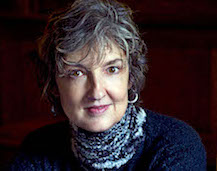Barbara Kingsolver
 Photo by Annie Griffiths
Photo by Annie Griffiths
Named one of the most important writers of the 20th century by Writer’s Digest, Barbara Kingsolver has followed her curiosity in novels that explore human nature, political repression, and ecological imperatives with a scientist’s knowledge. An entomologist is the hero of her most recent novel, "Flight Behavior" (2012), which explores the winter migration of monarch butterflies, climate change, and the culture clash between religion and science.
Born in 1955, Kingsolver grew up in rural Kentucky. She entered DePauw University, in Indiana, on a piano scholarship and soon changed her major to biology, a choice made "in the practical hope of someday earning a living."
While nurturing a private passion for writing, Kingsolver completed a graduate degree in biology at the University of Arizona where she had gone to "see the West." She worked for the university as a scientific writer for a few years before venturing into full-time freelancing in 1985. Three years later, her first novel, "The Bean Trees," was published.
Kingsolver came to prominence as an author with her fourth novel, "The Poisonwood Bible," a 1998 bestseller and finalist for the Pulitzer Prize. The New York Times noted that this story of an American missionary family in Africa was distinguished by "Kingsolver’s polymathy" that "leads to discourses on medicine, the Bible, cold-war machinations."
She has also contributed work to numerous literary anthologies, magazines and newspapers. After moving from Tucson to a farm in Virginia, Kingsolver’s interest in farming and food economies prompted the nonfiction book, "Animal, Vegetable, Miracle" (2007), a recounting of one year her family spent producing or procuring only local food.
Kingsolver established the Bellwether Prize in 2000, "to promote fiction that addresses issues of social justice and the impact of culture and politics on human relationships." The $25,000 prize has helped to launch the careers of several new American literary voices.














